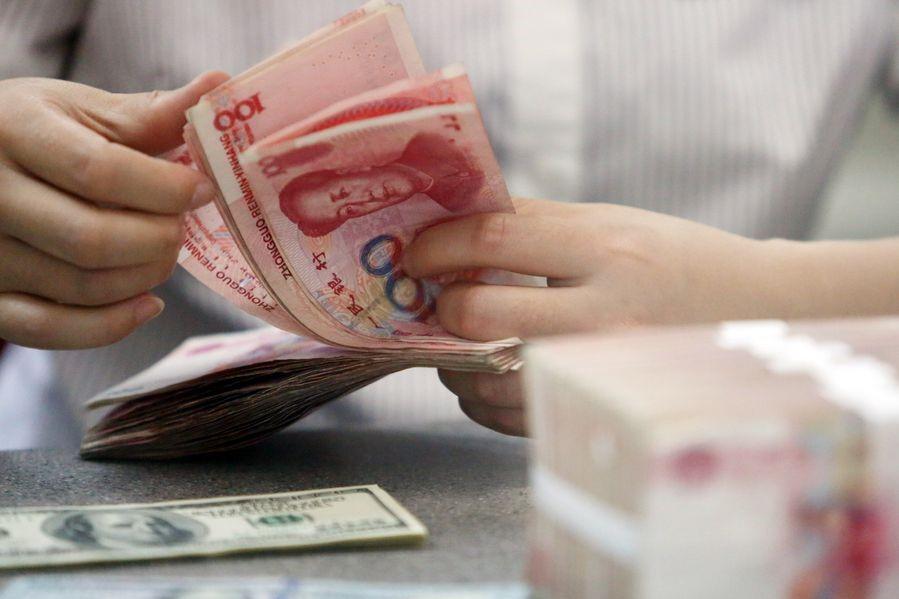
 0 Comment(s)
0 Comment(s) Print
Print E-mail China Daily, January 16, 2024
E-mail China Daily, January 16, 2024

A worker counts Chinese currency renminbi at a bank in Linyi, East China's Shandong province. [Photo/Xinhua]
It remains likely that China's monetary policymakers will cut interest rates in the first quarter as pressure of insufficient domestic demand remains pressing while external constraints on monetary easing wane, political advisers and experts said.
However, the decision by the People's Bank of China — the country's central bank — to hold a key interest rate steady on Monday suggested that any further aggregate easing moves may be moderate, they said. This caution reflects the central bank's emphasis on preserving bank profitability and a preference for structural policy tools that offer greater efficacy.
The PBOC conducted a one-year medium-term lending facility operation of 995 billion yuan ($138.66 billion) on Monday, with the operation rate — a key lending rate benchmark — remaining unchanged for the fifth consecutive month at 2.5 percent.
The move ran counter to market anticipations that the PBOC may implement an interest rate cut on Monday after the country's weak inflation data pointed to the need for easing policies to bolster subdued demand.
China's consumer price index, a key gauge of inflation, reported negative growth year-on-year for the third month in a row in December — for the first time since 2009 — standing at — 0.3 percent versus — 0.5 percent in November.
Experts said the decision to keep interest rate steady might have signaled the central bank's intention to preserve the policy scope for any potential further downward economic pressure.
At the annual PBOC work meeting earlier this month, it was decided that reforms should be deepened to promote reductions in social financing costs while keeping things stable overall as part of the central bank's efforts to make monetary policy flexible and effective.
Gong Liutang, a professor of applied economics at Peking University's Guanghua School of Management, said it remains essential to reduce lending rates for businesses to stimulate their willingness to lend and invest, as their actual financing costs — as measured by real interest rates, which are equivalent to nominal interest rates minus inflation — remain relatively high as December's uptick in inflation was limited.
Corporate financing demand is still in need of support as new renminbi loans decreased year-on-year in December, said Gong, who is also a member of the 14th National Committee of the Chinese People's Political Consultative Conference, the country's top political advisory body.
New yuan-denominated loans came in at 1.17 trillion yuan in December, the PBOC said on Friday, down by 240.1 billion yuan from a year earlier.
"It is clear there remains scope for monetary policy to step up support as demand remains insufficient, with the CPI and producer price index lingering in negative territory," said Shao Yu, a board member of Shanghai Institution for Finance & Development, a think tank.
Cuts in interest rates and the reserve requirement ratio may still be in the pipeline in the first quarter, Shao said, adding that pressure from US monetary tightening on China's monetary policy will diminish as the US Federal Reserve is poised for rate cuts this year.
Capital outflow pressure on China due to US tightening has eased as foreign investors made net purchases of Chinese onshore bonds for months, including a net purchase of $24.5 billion in December, the State Administration of Foreign Exchange said on Monday.
"Yet the more important question is how to ensure that lower funding costs or increased money supply would effectively translate into lending to businesses and households, thereby stimulating investment and consumption," said Shao, who is also an expert member on the PBOC's monetary policy committee.
In this sense, structural monetary policy tools — which are possibly designed to support specific investment projects or in coordination with fiscal policy — could be more effective in jazzing up the economy and be more commonly utilized, he added.
Go to Forum >>0 Comment(s)